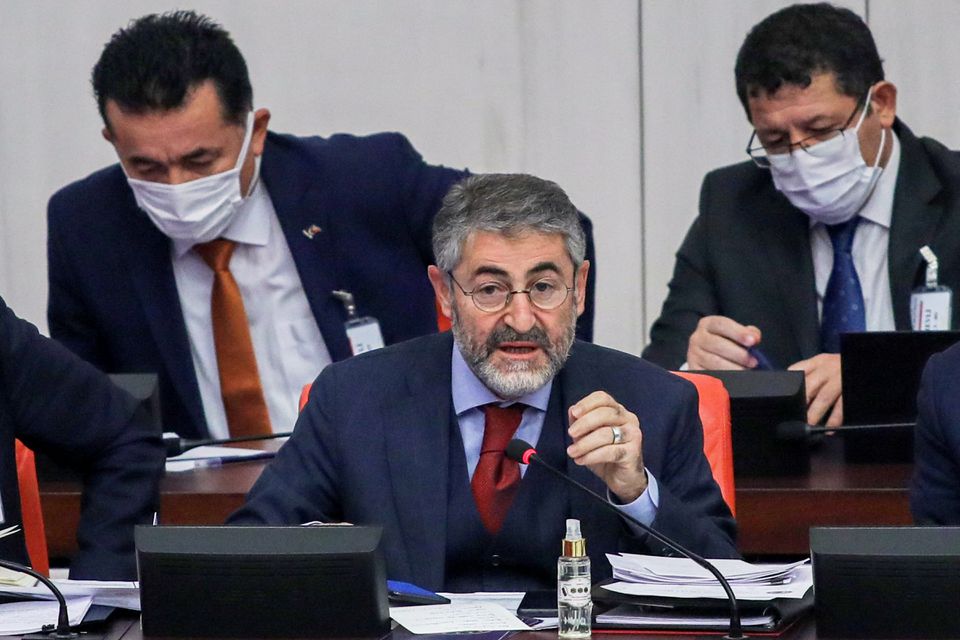Finance Minister Nureddin Nebati pitched Turkey’s unorthodox economic policy to investors in London on Tuesday, pledging to keep the exchange rate stable, bring inflation down to single digits and keep dollarization at bay.
Speaking to investors and bankers in a series of meetings on his first trip abroad, Nebati also said Ankara would announce a new scheme on the weekend to get households to convert holdings of gold into lira and forecast revenues from the key tourism sector would recover to $34.5 billion this year.
The lira has been broadly stable since the start of the year following a bruising 44 per cent slump in 2021 when the central bank slashed its policy rate in line with an unorthodox policy driven by President Tayyip Erdogan despite soaring inflation. On Tuesday, the lira strengthened 0.4 per cent to 13.558 against the dollar by 2100 GMT.
“The key is the exchange rate anchor – their line is the selloff in December was abnormal and extreme, and where we are now the currency is more defendable,” said Tim Ash at BlueBay Asset Management who met with the minister in London.
The central bank burnt through nearly $20 billion in foreign reserves in December to underpin the currency, which whip-sawed from 18.4 to 10.25 against the dollar.
Ash said Nebati described inflation as a major challenge and agreed it was “the biggest problem they have got”.
However, other investors said Nebati shirked questions about how much of the country’s FX reserves might be needed to keep the lira anchored this year as authorities try to grapple with annual inflation rates closing in on 50 per cent.
Under Erdogan’s new economic policy, the government aims to ease inflation by creating a current account surplus – rather than by hiking the policy interest rate, which was cut to 14 per cent.
“The message was very much: We are going to keep the exchange rate stable … and this will help the whole path of inflation to drop off precipitously and for us to reach single digit inflation by early next year,” another investor said on condition of anonymity.
The government would also announce a new scheme on the weekend to encourage households to convert gold holdings, which he estimated at $250-$350 billion, into liras, the minister was quoted as saying.
BORROWING
Investors are also eyeing Ankara’s foreign borrowing plans.
Two sources familiar with the plan said Turkey was preparing to sell a dollar-denominated sukuk, its first dollar bond sale since September. One source said HSBC was among banks hired for the deal.
The Treasury did not immediately comment on the possible sale. According to Refinitiv data, Turkey is due to pay off a $2 billion eurobond on Feb. 21 and a $1.1 billion domestic bond on Feb. 25.
Nebati also said at investor meetings that the government had held very productive talks with Abu Dhabi, Saudi Arabia and Israel in recent days, and swap lines were being agreed. He declined to give further details.
According to analyst calculations, based on the central bank’s analytical balance sheet data, net and gross reserves rose some $5-6 billion last week.
Bankers said the rise may be due to the bank’s $4.7 billion swap accord with the United Arab Emirates and a new requirement that 25 per cent of exporters’ forex earnings be sold to the bank.
Swap deals with foreign central banks help bolster reserves which were eroded by forex market interventions. From January, the central bank has followed a more active forex reserves policy. Several bankers have described the situation as a managed exchange rate or “dirty float”.
The lira hit a record low of 18.4 in late December but rebounded after state intervention to support it and Erdogan’s announcement of a scheme to boost lira deposits by protecting them against depreciation.
The volume of deposits under the lira protection scheme now exceeds 290 billion lira ($21.4 billion), the government says.







Click here to change your cookie preferences